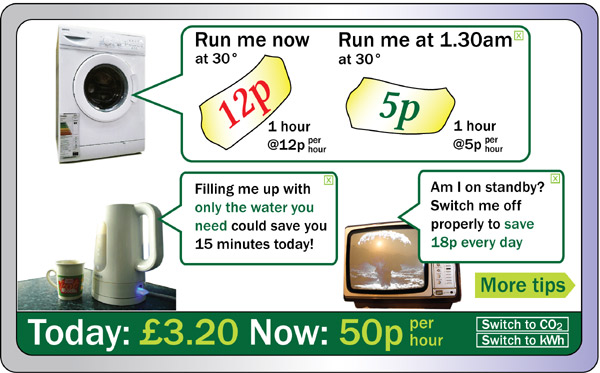Energy use recommendations
There are a number of systems and projects out there which aim to provide advice on your energy consumption. I don’t personally do research on this stuff but it is quite closely related with my core work of disaggregation. So I wanted to start a list of energy use recommendations projects.
THIS LIST IS BY NO MEANS EXHAUSTIVE YET! Please, if you know of an energy recommendation project not currently on this list then please leave a comment and I’ll add it! (Makes me think we need a wiki for this type of stuff…)
IDEAL home energy advice project, UK
“Reducing energy demand from existing dwellings through occupant behaviour change is crucial for meeting UK carbon emission reduction targets and will help the increasing numbers of households struggling to pay their energy bills. Our team of computer scientists, building engineers and sociologists will work together to explore the interaction of energy technologies and householder behaviours related to energy in a sample of 600 dwellings. Using wireless sensing, machine learning, and natural language generation technologies, we will construct an intelligent advice loop that will provide information to householders on what activities they are engaging in which use energy and how much energy is used for each one, together with suggestions for what they might do to reduce their energy expenditure; for example: “Last week you spent £10 on hot water for showers, if you reduced your average shower time from 15 minutes to 12 minutes you could save £100 per year”. If we can show that this loop is effective in helping people to reduce their energy demand, then we expect that energy suppliers and other companies will start to offer it as a service to households to help them keep their energy costs down.”
The Electric20 Trials, Nottingham
” The first field-trial of Electric20 is coming to a close, having run since the start of September 2011. The first Electric20 ‘neighbourhood’ consisted of (at its peak) 28 homes, with singles, couples, families and groups from a variety of backgrounds, all taking in a set of equipment that allowed Electric20 to monitor their electricity use. In return, Electric20 provided insights into their consumption, through a set of simple visualisations and representations delivered by electric20.com, SMS and Twitter. More than simply a technical proof-of-concept, the first Electric20 trial aimed to explore how households understood electricity in their home and whether new forms of feedback might alter this understanding, and subsequently behaviour. “
(Thanks Oli Parsons for letting me know about Electric20!)
CHARM
To quote their website:
“CHARM, funded by the RCUK Digital Economy Programme, employs digital technologies as a means of providing individuals with feedback about their own and others’ sustainability behaviours. Thus, the three-year project examines the potential for telling people what other people do
- the so-called ‘social norm’ approach - to change individual practices and behaviours in socially-desirable ways… This approach has been successfully employed in the contexts of alcohol and substance abuse, and sustainability issues such as electricity consumption, recycling and hotel towel reuse.”.
There are a handful of papers listed on the CHARM website.
Dan Lockton (a researcher at WMG, University of Warwick, and at Brunel University in London, specialising in design for behaviour change for social and environmental benefit) has also done some work on recommendations. For example, he produced this mock-up image (taken from an interesting 2009 blog post on “Smart Meters: some thoughts from a design point of view”):

EMPOWER
Dan Lockton is involved in a £580K research project at Brunel “to unearth how good design can cut energy use” called EMPOWER which may also be of interest. EMPOWER “aims to reduce workplace energy use through connecting people with energy and behavioural data in engaging ways.”
My 10:10
10:10 have an online tool called My 10:10 to help encourage people to cut their carbon emissions. Lots of pretty graphics, gamification and social stuff.